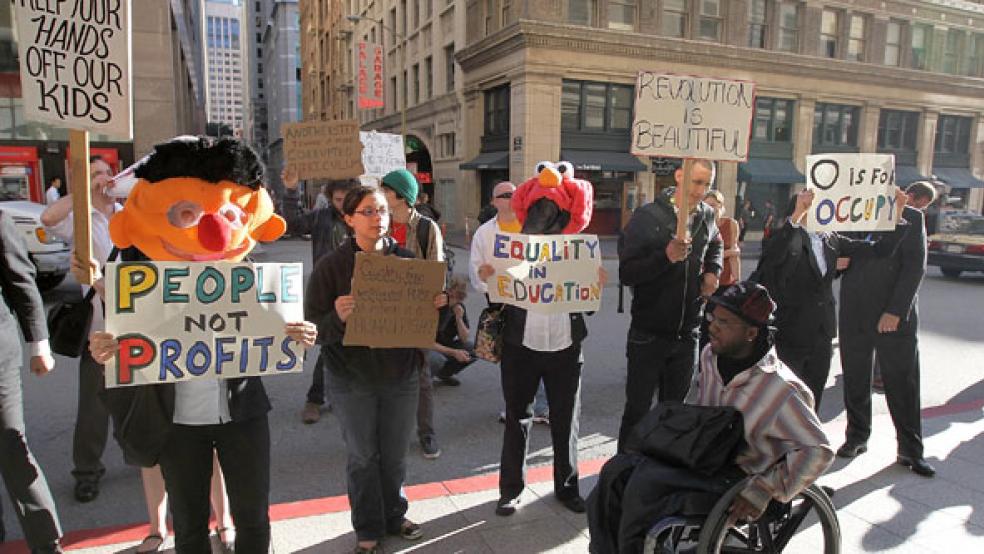The Occupy Wall Street movement that started out as a relatively small gathering in lower Manhattan on September 17 has grown into a global event four weeks later. Through blogs, Twitter, and Facebook pages, protest organizers were preparing for a “global day of action against Wall Street greed” on Saturday, claiming to have coordinated demonstrations scheduled for 951 cities in 82 countries across the U.S., Europe, and even Asia, Africa, and South America.
In England, organizers of Occupy London Stock Exchange called on supporters to meet at St. Paul’s Cathedral—not the stock exchange—at noon and encouraged anyone “thinking of staying for a while” to bring “plenty of food and water” as well as “a tent and a sleeping bag.” In Phoenix, Ariz., organizers of a pre-protest march asked attendees to “Please be polite, don't litter, support local businesses, bring sunscreen, and bring your own water in a reusable water bottle.”
Critics have repeatedly noted that the intentionally leaderless activists have not laid out specific demands or solutions to the large scale problems they are protesting, including what the Occupy Wall Streeters describe as the corrosive role that corporate money plays in American politics. Even former President Bill Clinton, speaking earlier this week on The Late Show with David Letterman, noted that the protesters would “have to transfer their energies at some point to making some specific suggestions, bringing in people who know more to try to put the country back to work.”
But in New York, where protesters this week marched past the homes of several notable billionaires and demonstrated against JPMorgan Chase, the Saturday agenda includes one specific, if smaller, call to action: a march to a Chase bank branch, where customers plan to “close their accounts and then transfer the money to worker-owned banks and credit unions around the city.”
That march—and the planned worldwide outpouring—come just a day after OSW protesters at the original site in lower Manhattan feared they might be evicted from Zuccotti Park, where they have been since the middle of last month. Park owner Brookfield Properties told New York City officials that it wanted to clean the area and enforce rules banning tents and sleeping bags. The protesters then spruced up the park themselves and planned to resist any efforts to move them, but a potential standoff was averted when Brookfield backed down and told Mayor Michael Bloomberg’s administration that it would postpone the cleaning that had been scheduled to start at 7 a.m. Even so, some demonstrators reportedly clashed with police as they marched through the financial district, with 15 protestors reportedly arrested.
The Occupy movement, built in part on lingering anger over the 2008 bank bailouts, has been likened to a left-wing version of the Tea Party uprising, but—at least for the moment—its populist message is winning wider approval than that of the more established Tea Party. A Time magazine poll of 1,001 Americans, conducted on October 9 and 10, found that 54 percent have a favorable opinion of the OWS protests, while 23 percent view them unfavorably. Similarly, an NBC News/Wall Street Journal survey (PDF) found that 37 percent of respondents "tend to support" the Occupy Wall Street movement, while only 18 percent "tend to oppose" it.
The Tea Party fared worse in both polls, with 27 percent of respondents in the Time survey saying they have a favorable view of that movement compared with 33 percent unfavorable. The NBC/WSJ survey found a 28 percent positive/41 percent negative split on the Tea Party.
The Time poll also found that:
- 86 percent of those surveyed agree that “Wall Street and its lobbyists have too much influence in Washington”
- 79 percent feel that “the gap between rich and poor in the United States has grown too large”
- 71 percent say that “executives of financial institutions responsible for the financial meltdown in 2008 should be prosecuted”
- 68 percent agree that “the rich should pay more taxes”
But, as Jon Bershad and others point out, it’s easy to get popular railing against “rich bankers” and “income inequality.” It’s much harder to keep that support when you have to translate that message into specific political action and overt partisan affiliations.
And while the Tea Party—whether it’s now popular or not—has clearly influenced our national debate on debt, deficits, and the role of government, the ultimate effects of the OSW protests, even as they spread far from the financial capital of the world, remains to be seen. “United in one voice, we will let politicians, and the financial elites they serve, know it is up to us, the people, to decide our future,” reads a (typically vague) statement on the website for Saturday’s worldwide protests. “On October 15th, we will meet on the streets to initiate the global change we want. We will peacefully demonstrate, talk and organize until we make it happen.” The public seems less certain of that. More than half of respondents in the Time poll, 56 percent, say the protest movement will have little impact on the political scene.
Today’s turnout could go a long way in determining whether those skeptics are right.





